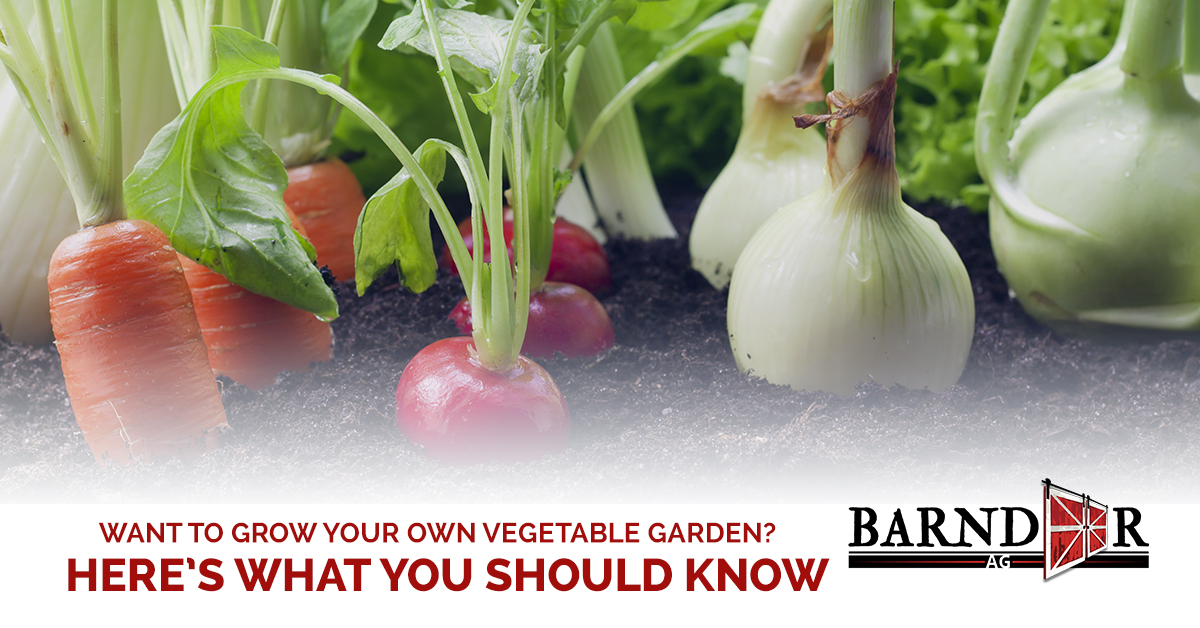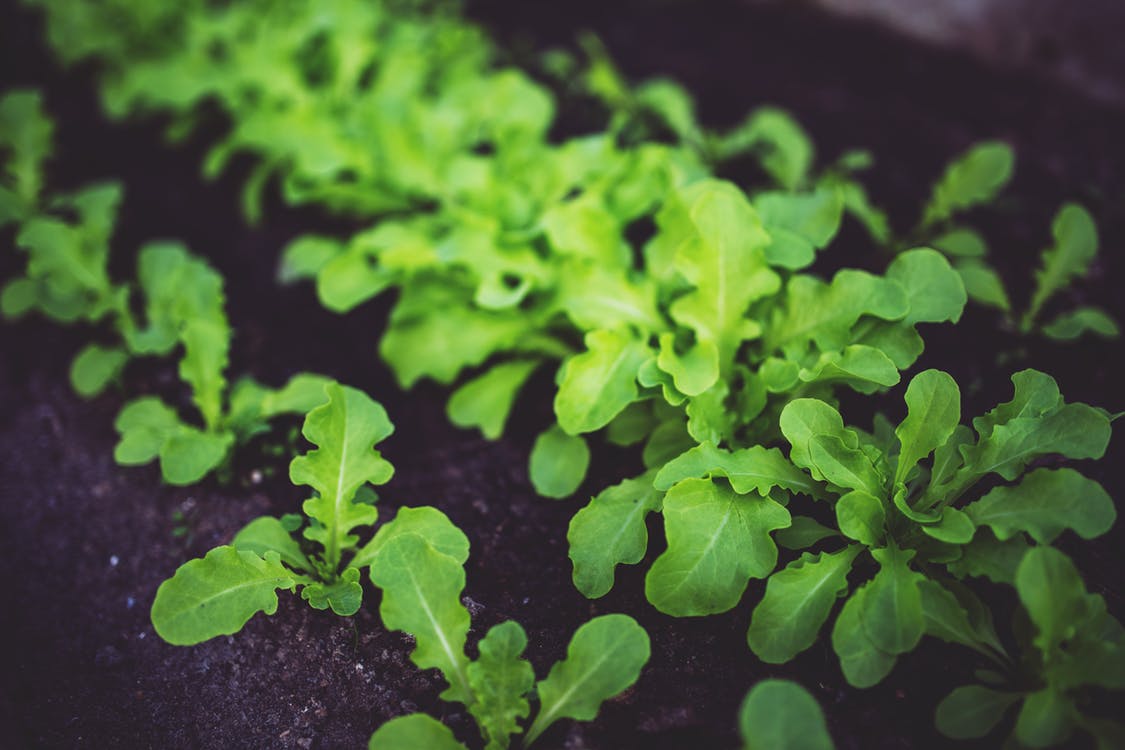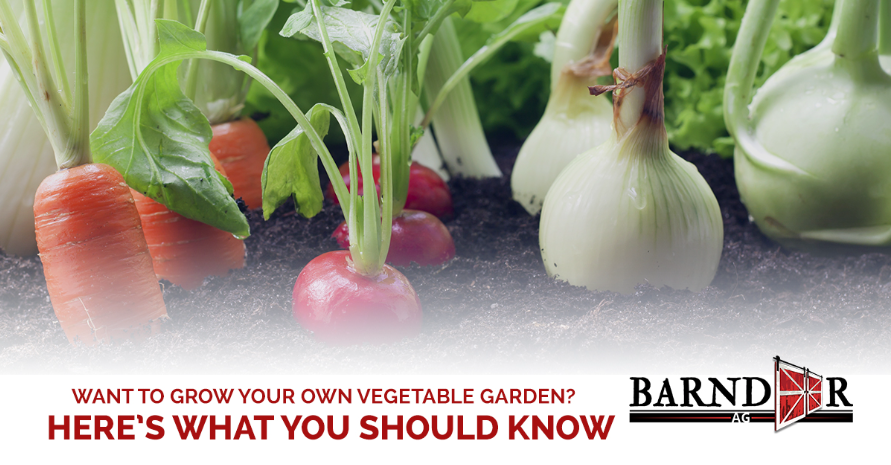
If you’re thinking about growing your own vegetable garden, you’ve come to the right place! There are many benefits to growing your own veggies, but above all else, we’ve found that harvesting your own food can be both fun and extremely rewarding. If you truly want to be a successful vegetable gardener, you’ll need to take some time to research what it takes to keep plants healthy.
At Barndoor Ag, we’re proud to be a leading provider of agricultural supplies and farming equipment online. Whether you’re looking for effective chemicals, we’ve got the supplies and tools you need to help your garden flourish. If you’re struggling to keep unwanted pests and insects out of your garden, be sure to browse our insect and pest control solutions today.
In this blog, we’re going to discuss the basics of starting your own vegetable garden. Whether you’re a novice gardener with a single pot, or you’ve been growing your own vegetables for years, we’re confident you’ll learn something new.
How To Start Your Own Vegetable Garden
If you’ve ever taken a bite out of a fresh grown tomato, you already know how delicious and savory growing your own food can be. There’s nothing like fresh vegetables, especially when you take the time to grow them yourself. Before you start planting seeds and reaping the benefits of your own personal vegetable garden, you’ll have to scope out the perfect location to start your garden.

Choosing A Location For Your Vegetable Garden
The key to a successful vegetable garden is to choose an appropriate outdoor location. A sub-par location will give you sub-par veggies, which is the last thing you want. Let’s look at a few tips to consider for choosing a good gardening site.
- Find a sunny location. Did you know that most popular vegetables like lettuce and broccoli need at least six hours of direct sunlight a day? The more sunlight your veggies see, the better they will taste when it comes time to eat them.
- Don’t forget the importance of high-quality soil. Whether you plan on planting carrots or tomatoes, the roots of your plants will be able to penetrate soft soil more easily. It’s also a good idea to enrich your soil with compost to provide your vegetables with extra nutrients. Proper drainage is also important to consider, to ensure that extra water doesn’t collect on top of your plants.
- Build your garden in a stable environment. Do not put your vegetable garden in a part of the yard that is prone to flooding. You also don’t want to have your garden somewhere where strongs winds are present, as they could knock over your plants down the line.
At Barndoor Ag, we’re passionate about helping our customers find the best gardening products and tools for their needs.
Deciding On A Plot Size For Your Garden
If you’re brand new to the world of gardening, keep this tip in mind: it’s better to be proud of a small garden than to be frustrated by a large one! A common error many beginner gardeners make is planting too many items, too soon. A good-size beginner vegetable garden should be about 16 by 10 feet, and you should choose crops that are easy to grow. Some of the easiest vegetables to start gardening with include tomatoes, zucchini squash, peppers, lettuce, carrots, and beets.
Tips For Growing The Best Vegetables In Town
While the location and plot size of your vegetable garden are very important to your success, it’s time to start discussing how to go about growing the best vegetables. Some important things to keep in mind include:
- Using high-quality seeds. While you may be tempted to buy a boat load of seed packets because they are much less expensive than individual plants, if your seeds don’t germinate, all of your money and time will be wasted. By spending a few extra dollars, you can pick up seeds from this year, which will pay off in higher yields when it comes times to harvest.
- Space your crops! Depending on the type of vegetables you want to grow, it’s important to space them out properly to avoid overcrowding. Plants that grow too close together will compete for sunlight, water, and nutrition. If you’re not sure how to space your veggies, pay attention to the spacing guidelines often found on the seed packets and plant tubes.
- Water your plants frequently. This will give your veggies the best chance at producing fresh and mature veggies.
Consider Crop Rotation
Crop rotation is a great way to ensure your vegetable garden will not deplete in nutrients year after year. Crop rotation is simply the act of rotating the vegetables within your garden. Many gardening aficionados recommend planting the same crop in the same place once every three years. This is also an efficient way to help foil an insects, pests, or disease pathogens that may be lurking in your garden’s soil.
Barndoor Ag: Your Partner In Garden Supplies
We hope that this article has been helpful as you venture toward growing your very own vegetable garden. At Barndoor Ag, we take great pride in offering some of the best agricultural supplies and gardening tools to our online customers. Browse our online store for the best garden tools and accessories today!
 US Dollars
US Dollars
 Canadian Dollar
Canadian Dollar
 Australian Dollar
Australian Dollar
 Euro
Euro

